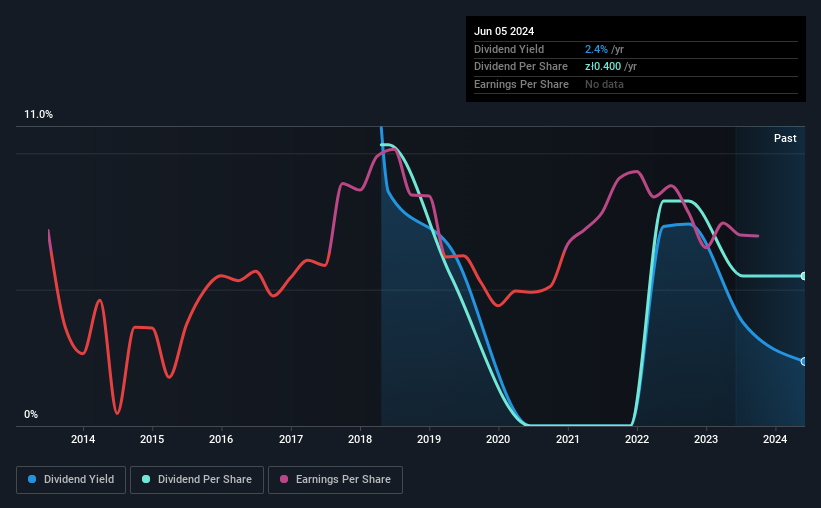- Poland
- /
- Professional Services
- /
- WSE:DGA
Do These 3 Checks Before Buying DGA Spólka Akcyjna (WSE:DGA) For Its Upcoming Dividend

DGA Spólka Akcyjna (WSE:DGA) is about to trade ex-dividend in the next four days. The ex-dividend date is one business day before a company's record date, which is the date on which the company determines which shareholders are entitled to receive a dividend. The ex-dividend date is important as the process of settlement involves two full business days. So if you miss that date, you would not show up on the company's books on the record date. Therefore, if you purchase DGA Spólka Akcyjna's shares on or after the 11th of June, you won't be eligible to receive the dividend, when it is paid on the 19th of June.
The company's next dividend payment will be zł0.30 per share, and in the last 12 months, the company paid a total of zł0.40 per share. Based on the last year's worth of payments, DGA Spólka Akcyjna stock has a trailing yield of around 2.4% on the current share price of zł16.90. If you buy this business for its dividend, you should have an idea of whether DGA Spólka Akcyjna's dividend is reliable and sustainable. That's why we should always check whether the dividend payments appear sustainable, and if the company is growing.
View our latest analysis for DGA Spólka Akcyjna
Dividends are typically paid from company earnings. If a company pays more in dividends than it earned in profit, then the dividend could be unsustainable. DGA Spólka Akcyjna paid out more than half (66%) of its earnings last year, which is a regular payout ratio for most companies. A useful secondary check can be to evaluate whether DGA Spólka Akcyjna generated enough free cash flow to afford its dividend.
Click here to see how much of its profit DGA Spólka Akcyjna paid out over the last 12 months.

Have Earnings And Dividends Been Growing?
When earnings decline, dividend companies become much harder to analyse and own safely. If earnings fall far enough, the company could be forced to cut its dividend. With that in mind, we're discomforted by DGA Spólka Akcyjna's 23% per annum decline in earnings in the past five years. Such a sharp decline casts doubt on the future sustainability of the dividend.
The main way most investors will assess a company's dividend prospects is by checking the historical rate of dividend growth. DGA Spólka Akcyjna has seen its dividend decline 9.9% per annum on average over the past six years, which is not great to see. It's never nice to see earnings and dividends falling, but at least management has cut the dividend rather than potentially risk the company's health in an attempt to maintain it.
The Bottom Line
From a dividend perspective, should investors buy or avoid DGA Spólka Akcyjna? DGA Spólka Akcyjna had an average payout ratio, but its free cash flow was lower and earnings per share have been declining. It's not the most attractive proposition from a dividend perspective, and we'd probably give this one a miss for now.
With that being said, if you're still considering DGA Spólka Akcyjna as an investment, you'll find it beneficial to know what risks this stock is facing. Our analysis shows 5 warning signs for DGA Spólka Akcyjna that we strongly recommend you have a look at before investing in the company.
Generally, we wouldn't recommend just buying the first dividend stock you see. Here's a curated list of interesting stocks that are strong dividend payers.
New: Manage All Your Stock Portfolios in One Place
We've created the ultimate portfolio companion for stock investors, and it's free.
• Connect an unlimited number of Portfolios and see your total in one currency
• Be alerted to new Warning Signs or Risks via email or mobile
• Track the Fair Value of your stocks
Have feedback on this article? Concerned about the content? Get in touch with us directly. Alternatively, email editorial-team (at) simplywallst.com.
This article by Simply Wall St is general in nature. We provide commentary based on historical data and analyst forecasts only using an unbiased methodology and our articles are not intended to be financial advice. It does not constitute a recommendation to buy or sell any stock, and does not take account of your objectives, or your financial situation. We aim to bring you long-term focused analysis driven by fundamental data. Note that our analysis may not factor in the latest price-sensitive company announcements or qualitative material. Simply Wall St has no position in any stocks mentioned.
About WSE:DGA
DGA Spólka Akcyjna
Operates as an advisory and investment company in Poland.
Flawless balance sheet moderate.


